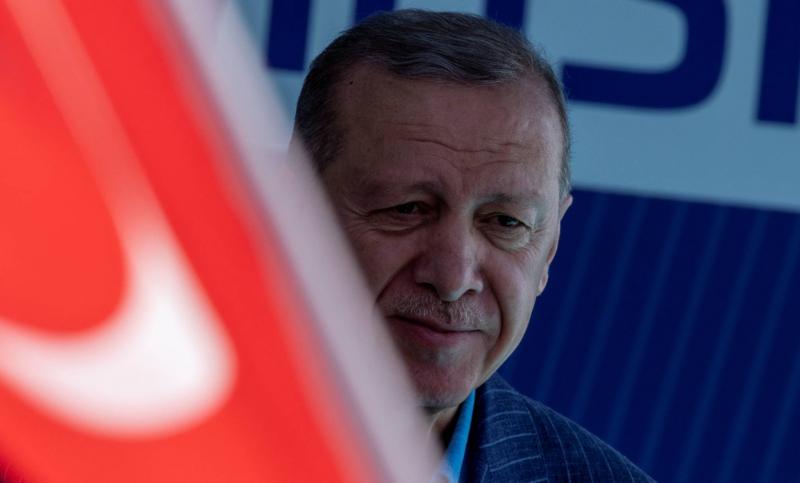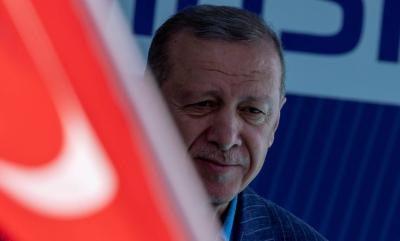Turkish President Recep Tayyip Erdogan has won the second round of elections in Turkey, according to the head of the Supreme Election Board, after more than 75% of the votes were counted. The ballot boxes in the runoff of the Turkish elections closed on Sunday evening, and the counting of votes began. Earlier, Erdogan stated in a speech after voting in the runoff, "I expect the results to come out faster than in the first round... the people will choose their president, and I will respect their decision."
His opponent Kemal Kilicdaroglu called on "everyone to participate in eliminating the authoritarian system and to vote for true democracy." He added, "Freedom will prevail in our country." Voting began at 8 AM (05:00 GMT) and ended at 5 PM (14:00 GMT). Results are expected to start emerging by this evening.
Erdogan, 69, defied polls and gained a comfortable lead of around five points over Kilicdaroglu in the first round on May 14. However, he failed to secure the required 50% needed to win outright in the first round of a race that has severe implications for Turkey and the global geopolitical landscape. Erdogan's unexpectedly strong performance amidst a deep cost-of-living crisis, along with a coalition victory that includes his conservative Justice and Development Party (AKP) and the Nationalist Movement Party, bolstered the seasoned president, who argued that voting for him is a vote for stability.
Kilicdaroglu is the candidate of a six-party opposition alliance and leads the Republican People's Party, founded by Turkey's founder Mustafa Kemal Atatürk. His camp struggled to regain momentum after the shock of Erdogan's first-round success.
The elections will not only determine who governs Turkey, a NATO member state with a population of 85 million, but also how it is governed and its economic directions after its currency dropped to a tenth of its value against the dollar over the past decade. They will also shape its foreign policy, which has angered the West due to Turkey's warming relations with Russia and Gulf countries. Initial election results showed unexpected support for nationalism, a strong current in Turkish politics fueled by years of conflict with Kurdish militants, a failed coup attempt in 2016, and an influx of millions of refugees from Syria since the war began in 2011.
Turkey is the world's largest host country for refugees, with around five million migrants, including 3.3 million Syrians, according to the Interior Ministry.
The third-place presidential candidate, Sinan Oğan, a hardline nationalist, stated that he supports Erdogan based on the principle of "continuous struggle (against) terrorism," referring to Kurdish-affiliated groups. Oğan received 5.17% of the votes. Another nationalist, Umut Özdağ, leader of the anti-migration Victory Party, announced an agreement to support Kilicdaroglu, stating he would return migrants to their home countries. The Victory Party garnered 2.2% of the votes in the parliamentary elections held this month.
Nationalists are divided, with each faction supporting a different side. A poll by the Konda research and consulting company suggested Erdogan’s expected support in the runoff would be 52.7% compared to 47.3% for Kilicdaroglu, after accounting for undecided voters. This poll was conducted on May 20-21 before Oğan and Özdağ announced their stances.
An important element is how the Kurds in Turkey, who make up around 20% of the population, will vote. The pro-Kurdish Peoples' Democratic Party supported Kilicdaroglu in the first round, but after he shifted rightward to win nationalist votes, they did not explicitly endorse him and urged voters to reject Erdogan's "one-man regime" in the runoff.
Throughout the day, Turks continued to cast their votes, and by late Sunday evening, a clear indication of the winner should be available. Nicholas Danforth, a non-resident fellow at the Hellenic Foundation for European and Foreign Policy (ELIAMEP) and an expert in Turkish history, stated, "Turkey has a long-standing democratic tradition and a long-standing nationalist tradition, and it is now clear that the nationalist tradition has won."
He added, "More Erdogan means more Erdogan. People know who he is and what his vision for the country is, and it seems that many of them agree with it." The Turkish President put forth considerable effort during his campaign while struggling to survive his toughest political test. He enjoys absolute loyalty from devout Turks who have felt that the secular nature of Turkey deprived them of their rights. Erdogan previously overcame an attempted coup in 2016 and has weathered numerous corruption scandals.
During his long tenure, Erdogan has tightened his grip on most Turkish institutions and marginalized liberals and opponents. Human Rights Watch stated in its 2022 World Report that Erdogan's government has rolled back Turkey's human rights record by decades.
However, if Turks oust Erdogan, it would largely be due to feelings of change in their economic situation and dwindling ability to meet basic needs amid inflation exceeding 85% in October 2022 and the collapse of the lira. On the other hand, Kilicdaroglu has pledged to return to traditional economic policies and distance himself from Erdogan's policies if he wins. He has also stated that he will seek to restore the country to a parliamentary governing system, abolishing the executive presidential system that Erdogan secured through a referendum in 2017.




